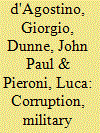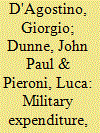| Srl | Item |
| 1 |
ID:
116064


|
|
|
|
|
| Publication |
2012.
|
| Summary/Abstract |
This paper considers the effect of corruption and military spending on economic growth, analysing both the direct impact of public spending and the effect of allocating resources between categories of public spending within the framework of an endogenous growth model. The model exhibits non-linearities as a result of the links between the components of public spending, corruption and economic growth. The main findings of the empirical analysis confirm the expectation that corruption and military burden lower the growth rate of gross domestic product per capita. They also suggest that when the effect of the complementarity between military spending and corruption is omitted, as in most studies, the impact of military burden on economic performance is underestimated.
|
|
|
|
|
|
|
|
|
|
|
|
|
|
|
|
| 2 |
ID:
167859


|
|
|
|
|
| Summary/Abstract |
While not always a concern for the general economic growth literature, the debate over the effects of military spending on growth continues to develop, with no consensus, but a deepening understanding of the limitations of previous work. One important issue that has not been adequately dealt with is the endogeneity of military spending in the growth equation, mainly because of the difficulty of finding any variables that would make adequate instruments. This paper considers this issue, using an endogenous growth model estimated on a large sample of 109 non-high-income countries for the period 1998–2012. The empirical analysis is framed within an instrumental variable setting that exploits the increase in military spending that occurs when unrest in a country escalates to turmoil. The estimation results show that endogeneity arising from reverse causality is a crucial issue, with the instrumental variable estimates providing a larger significant negative effect of military spending on growth than OLS would. This result is found to be robust to different sources of heterogeneity and different time periods.
|
|
|
|
|
|
|
|
|
|
|
|
|
|
|
|